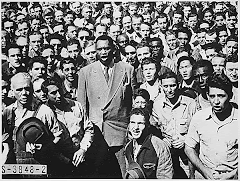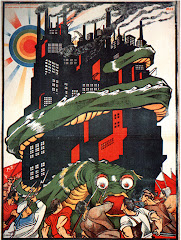This is the "Letter to the Editor" I submitted in response to this article:
Regarding your article, "Communist Party vice chairman speaks at MU."
Jarvis Tyner stated:
"He's only the beginning,I think he's a transitional president. I think somebody else is going to come in and take it even further."
Tyner only speaks for a very few Communists in stating this.
Such thinking is very dangerous because it leads people to think that Obama is some kind of friend of working people when he is nothing of the sort. Barack Obama's agenda is now very clear; his main priority is Wall Street profits; working people pay the bill and suffer... this is "the new normal"--- Wall Street made this mess and the coupon clippers brought in Barack Obama to help them profit some more from solving their problems on the back of the working class.
The Associated Press pointed out in an article, "Obama wants domestic spending cuts in next budget." These cuts are sure to hurt working people on the bottom the worst.
The article continues:
"The flow of red ink has been increased by war spending for Iraq and Afghanistan, recession-fighting stimulus and bank bailout spending and by reduced tax revenues from high unemployment and reduced personal and business income."
Obama can create all the "green" jobs he wants to but if those jobs continue paying working people nothing but poverty wages the economic mess our country is in is going to worsen.
Obama has even refused to enforce longstanding affirmative action policies leaving people of color and women who are already suffering horrible poverty to fend for themselves.
Obama is not a liberal, nor is he progressive; he is no friend of working people... he has refused to provide the change people thought they were voting for.
Barack Obama has shown himself to be nothing other than a slick talking insurance salesman.
Sounds to me like Jarvis Tyner is a member of the Democratic Party out on the stump campaigning for Barack Obama's second term when he should be leading the struggles for peace and for improving the lives of working people.
Tyner should be holding Obama accountable by telling him:
No peace; no votes.
No single-payer universal health care; no votes.
No living wage jobs; no votes.
Alan L. Maki
Another long-time Communist
58891 County Road 13
Warroad, Minnesota 56763
218-386-2432
Communist Party vice chairman speaks at MU
http://www.columbiamissourian.com/stories/2009/11/13/jarvis-tyner-speech/
Friday, November 13, 2009
COLUMBIA — Jarvis Tyner, executive vice chairman of the Communist Party USA, spoke at MU on Thursday and said the election of President Barack Obama opens the door for the left wing, which he feels has allowed itself to be pushed to the sidelines and overcome with progress-impeding cynicism, to mobilize.
"He's only the beginning," Tyner said. "I think he's a transitional president. I think somebody else is going to come in and take it even further."
Tyner spoke to an audience of about 70 people at MU's Ellis Auditorium. He focused on the transitional phase he feels the United States is in because of Obama's election.
Although the president is neither a communist nor socialist, his administration marks the country's movement away from the right-wing governments that have been dominant in the U.S. since the Reagan administration, Tyner said.
He said that while the Democratic Party is not without blame, the Republican leadership has been the source of the nation's problems that include an increase in poverty, a ruined economy, the continuation of global warming, impeded scientific research and the destruction of public schools by No Child Left Behind.
Tyner said he and his party are not completely satisfied with the work Obama has done since taking office, listing the need to withdraw troops more quickly from Iraq, for initiatives to end nuclear weapons and to re-establish trading relations with Cuba.
However, Tyner praised the public option in the recently passed House health care bill, saying Americans need to put massive pressure on the Senate to pass the legislation with the option intact. He also felt there should be public options for the auto and housing industries and for student loans.
A Communist Party USA member for more than 50 years, Tyner joined the party as a young worker in Philadelphia. He was the party's vice presidential nominee in1972 and 1976. Also a founding member of the Black Radical Congress, Tyner has fought for racial justice and workers' rights since the 1960s when he became active in the Civil Rights and Labor movements.
He said the next step for the Communist Party USA is to move more into the mainstream.
"We're not ready to run for president, but we are ready to run for City Council, school boards. And we're going to do that more," Tyner said.
MU senior Alaina Boyett, who attended the event, said she was already familiar with much of the material Tyner discussed because of a Marxism class she's enrolled in. She liked that he made a point to separate the Communist Party and ideals from what she felt they are associated with in the mass media.
"I thought he was fair in his criticism of Obama and the right-wing talking heads," Boyett said.
MU's Karl Marx Reading Group, which meets to discuss communist texts and how their arguments apply to political action today, organized the event because members were interested in hosting a speaker. Leadership in St. Louis suggested Tyner.
"I thought Jarvis would be a good spokesman for what we're all about because he's been fighting for social justice for so long and a party member for so long," said Jack Buthod, the group's president.
Buthod, who joined the group as a sophomore, said it has been around for a few years but wanted to bring a guest speaker in to draw attention and generate new membership. Although he identifies himself as a Marxist, he said not everyone in the group does.
"I'd say it's definitely a mix. There's multiple communists in the group, but there's also people more interested in talking about the ideas from different perspectives," he said.
A group of seven MU students set up a mock-gulag in Speakers Circle on Thursday evening as a reaction to the Tyner event, a demonstration referencing the Soviet labor camps used to imprison political dissenters as well as criminals.Gulags were at their most prominent during Joseph Stalin's reign. One protester dressed up as a Soviet guard and held three others captive in a white metal canopy surrounded by barbed wire. Others handed out flyers and spoke to passersby.
One protester held a cardboard sign that said, "This is the Communism Jarvis Tyner is promoting."
The group hoped the demonstration's proximity to Ellis Auditorium would attract the attention of attendees of Tyner's speech and lead them to come ask questions, although they said they were protesting communism in general and not Tyner specifically.
MU senior Eric Hobbs, who played the role of guard dressed in a forest green button-down shirt and trousers and a Soviet-style hat with earflaps, decided to protest when he saw a flier for Tyner's speech on campus Monday.
"I thought communism's message was going to be spread, and I thought it would be good to spread the message communism isn't that good," Hobbs said, who believes the governing philosophy leads to government abuse of power and oppression.
"The main goal of the protest is to most importantly remind people of the damage of communism, what can happen when the government has too much power," Hobbs said, giving the examples of the Soviet Union and Communist China.
MU sophomore Megan Roberts organized the mock-gulag, modeling the demonstration after one at Washington University in St. Louis, which students held Monday to commemorate the anniversary of the fall of the Berlin Wall.
Roberts, who was out of town Thursday night, said she anticipated that Tyner would either talk about the evils of capitalism or the glories of communism and wanted the protest to remind attendees, as well as Tyner himself, of the oppression and deaths caused by the philosophy.
"Communism is a very idealistic thing, and I think people lose sight of its evils and what it's done to humanity," Roberts said.
This is the "Letter to the Editor" I submitted in response to this article:
Regarding your article, "Communist Party vice chairman speaks at MU."
Jarvis Tyner stated:
"He's only the beginning,I think he's a transitional president. I think somebody else is going to come in and take it even further."
Tyner only speaks for a very few Communists in stating this.
Such thinking is very dangerous because it leads people to think that Obama is some kind of friend of working people when he is nothing of the sort. Barack Obama's agenda is now very clear; his main priority is Wall Street profits; working people pay the bill and suffer... this is "the new normal"--- Wall Street made this mess and the coupon clippers brought in Barack Obama to help them profit some more from solving their problems on the back of the working class.
The Associated Press pointed out in an article, "Obama wants domestic spending cuts in next budget." These cuts are sure to hurt working people on the bottom the worst.
The article continues:
"The flow of red ink has been increased by war spending for Iraq and Afghanistan, recession-fighting stimulus and bank bailout spending and by reduced tax revenues from high unemployment and reduced personal and business income."
Obama can create all the "green" jobs he wants to but if those jobs continue paying working people nothing but poverty wages the economic mess our country is in is going to worsen.
Obama has even refused to enforce longstanding affirmative action policies leaving people of color and women who are already suffering horrible poverty to fend for themselves.
Obama is not a liberal, nor is he progressive; he is no friend of working people... he has refused to provide the change people thought they were voting for.
Barack Obama has shown himself to be nothing other than a slick talking insurance salesman.
Sounds to me like Jarvis Tyner is a member of the Democratic Party out on the stump campaigning for Barack Obama's second term when he should be leading the struggles for peace and for improving the lives of working people.
Tyner should be holding Obama accountable by telling him:
No peace; no votes.
No single-payer universal health care; no votes.
No living wage jobs; no votes.
Alan L. Maki
Another long-time Communist
58891 County Road 13
Warroad, Minnesota 56763
218-386-2432









































